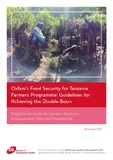| dc.contributor.author | Zambelli, Elena | |
| dc.contributor.author | Müller, Catherine | |
| dc.date.accessioned | 2018-01-08T13:28:45Z | |
| dc.date.available | 2018-01-08T13:28:45Z | |
| dc.date.issued | 2017-11 | |
| dc.identifier.citation | Zambelli, E. and Müller, C. (2017) Oxfam’s Food Security for Tanzania Farmers Programme: Guidelines for Achieving the Double Boon, Programmatic Note. Brighton. IDS | en |
| dc.identifier.uri | https://opendocs.ids.ac.uk/opendocs/handle/20.500.12413/13459 | |
| dc.description.abstract | The Oxfam Food Security for Tanzania Farmers programme (2012–15) aimed to increase food production and income, and improve the quality of life and food security for smallholder farmers, particularly women, in Tanzania. In Lushoto and Korogwe districts, it focused in particular on the domestic vegetable value chain (VVC), where rates of women’s participation are lower as compared to other agricultural crop production. In 2015–17, the project ‘Balancing unpaid care work and paid work: successes, challenges and lessons for women’s economic empowerment programmes and policies’ investigated how women’s economic empowerment (WEE) policies and programmes take unpaid care work into account, in order to enable women’s economic empowerment to be optimised. How does access to decent work play a key role in enabling women to achieve a ‘double boon’ through their participation in economically empowering work? This note discusses the main findings of the research in relation to the care-sensitivity of the Oxfam programme. It offers recommendations to Oxfam on how unpaid care work can be mainstreamed into its WEE programming, particularly by: helping to set up and maintain women’s groups to enable collective action; sharing its knowledge and experience to support other organisations in this kind of work; helping women lobby for increased access to markets; enabling women to campaign for better public services and infrastructure; helping families plan and redistribute the division of care tasks of household members; and encouraging families to send their children to school, discouraging the transfer of onerous care tasks that disrupt schooling. | en |
| dc.description.sponsorship | Department for International Development (DFID) | en |
| dc.description.sponsorship | William and Flora Hewlett Foundation | en |
| dc.description.sponsorship | International Development Research Centre (IDRC) | en |
| dc.language.iso | en | en |
| dc.publisher | Institute of Development Studies | |
| dc.rights.uri | http://creativecommons.org/licenses/by-sa/3.0/ | en |
| dc.subject | Agriculture | en |
| dc.subject | Gender | en |
| dc.subject | Poverty | en |
| dc.subject | Work and Labour | en |
| dc.title | Oxfam’s Food Security for Tanzania Farmers Programme: Guidelines for Achieving the Double Boon | en |
| dc.type | Other | en |
| dc.rights.holder | Institute of Development Studies | en |
| rioxxterms.funder | Default funder | en |
| rioxxterms.identifier.project | Default project | en |
| rioxxterms.version | NA | en |
| rioxxterms.funder.project | 9ce4e4dc-26e9-4d78-96e9-15e4dcac0642 | en |


